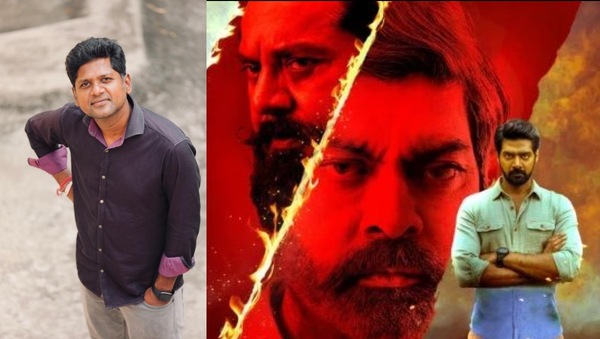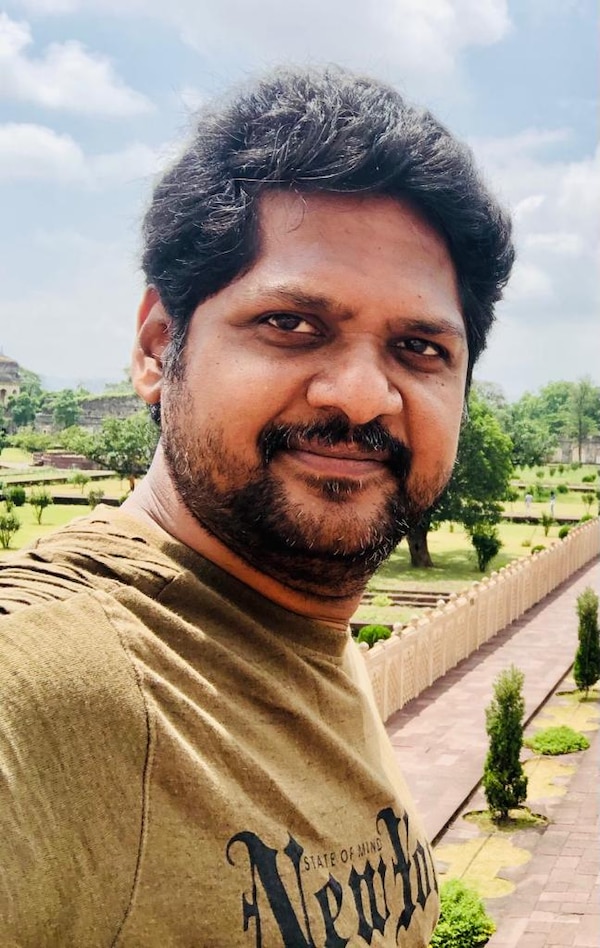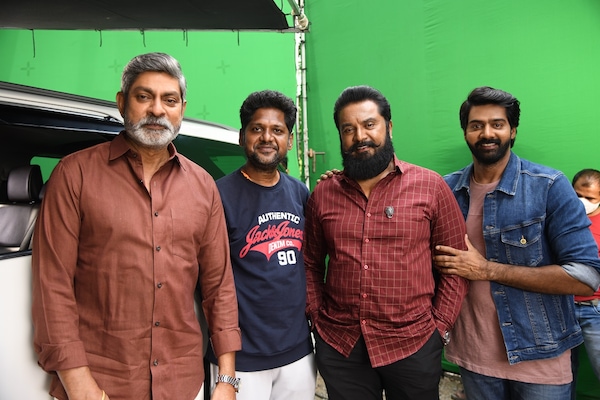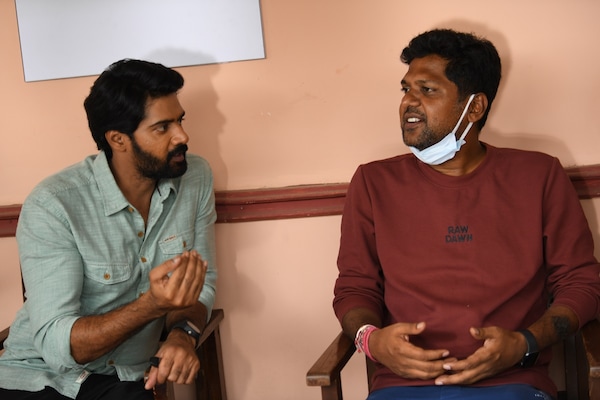Exclusive! Director Viswanath Arigela: Working with actors from three different generations in Parampara was thrilling
Viswanath Arigela, who helmed Jodi earlier, talks of his digital debut Parampara and the importance of practical on-set experience before one turns a director

Last Updated: 04.27 PM, Dec 29, 2021
Nellore-born director Viswanath Arigela, who makes his OTT debut with Disney+ Hotstar's Parampara, had a very clear line of thought about directing films ever since he was a teenager. It was love at first sight with the big screen. Nothing could deter his directorial ambitions. The only reason he enrolled in a business school was to please his mother and in fact, he was already an assistant director while pursuing MBA. After working in direction teams at different levels for films like Maska, Vaana and Cinema Choopista Mama, Viswanath's career as a director took off with Aadi, Shraddha Srinath starrer Jodi. Two years later, he forays into a different medium with similar zest. OTTplay.com sheds light on his tryst with filmmaking in this conversation.
Take us through your life before Jodi and what lead you to Parampara...
Waiting to direct your first film is a big task, especially with the competition and the variety of scripts out there. After Jodi, I got a call from Arka Mediaworks team to helm a few episodes for Parampara. The show was initially nine episodes long and I was quite happy to read such a well-written script. I thought the writer Hari Yelleti did a wonderful job of creating such an intriguing world full of strong characters. I was confident about its potential. I had to finish reading the script in barely a couple of days before I headed to shoot. It was inspiring to see actors like Jagapathi Babu, Sarath Kumar, Naveen Chandra and others come to the set with so much passion. That it was being mounted on a grand canvas on a never-heard-before budget in the digital space made me feel more responsible about it. There were a lot of struggles but here we are!
What was your childhood like? Were you destined to become a filmmaker always?
I was a film buff right from childhood and used to watch the same film four times a day, jumping from one theatre to another. Telling my story on the big screen is a high I wanted to experience at any cost. I grew up in Nellore and pursued my BBA, MBA in Hyderabad. Right during my MBA, I began working as an assistant director under MS Raju for Sumanth Arts for films like Vaana and Maska. I took a break from films for a couple of years and returned to the industry with greater enthusiasm. I was a chief associate director for Cinema Choopista Mama later and felt it was time for me to turn a director. I started writing scripts - it took almost a year and a half for me to finish scripting for Jodi. The film is based on real-life incidents and revolves around a family affected by a man addicted to cricket betting. From what I heard, people felt I did justice to the story.

Were BBA, MBA more of a safety net just in case a career in films didn't work out?
Honestly, I had to do it for my mother. My brother had completed his engineering and got settled in the US. My father died when I was very young and one of his desires was to see his sons as an engineer and a doctor. There was an engineer in the family already, my mom knew I couldn't handle medicine and thought I should at least have a formidable career and wanted me to take up MBA. My heart just wasn't there in it but I had to complete it for mom. There was no backup plan when I wanted to enter films; all I had was hunger and the driving force to see my name as a director on the big screen.
Did you ever consider enrolling in a film school? What does it take to be industry-ready?
At the end of the day, practical experience is necessary. When we study in schools or college, there's theory and application. Only 10% of what you study can be practically be executed in the field. The best part about working under a director is the exposure to different kinds of people, their approach to the job. The director is the captain of the ship because he not only has to supervise people handling 24 crafts but also need to finish the shoot as per schedule. He's responsible for the producer who's spending lakhs to deliver a quality result. Theory might open you to the various ways one can direct or write a story. However, a film school can't teach you about handling egos, extracting the right performance from actors amidst many limitations. A director needs to have patience. Every aspirant director needs to experience the process of translating the vision from paper onto the big screen at least once. There are various paths someone can adopt to direct films - come with a film school experience, direct short films or hone your craft by assisting someone.
What were your major takeaways from your stint with Sumanth Art Productions, while working for Vaana and Maska?
The main takeaway from assisting MS Raju and B Gopal was the knowledge of getting actors to perform the way you want, understand their temperament and handle creative differences smartly on sets. It's the major advantage of working in big banners. You learn to read a person, their moods and behave accordingly. What do we need to do to get the work done for the day? The script has to be finished before we enter sets and it's management skills that matter when we go to shoot. From action to pack up, nearly 180-200 people on set are waiting for directions from the director. There's immense pressure but one must not take it to head and focus on the immediate job.
The other director of Parampara, Krishna Vijay, had many kind words to say about you. What helped you two forge that rapport? It's hard for two directors to share a unified vision for a six-hour show.
Every director has his/her own identity and needs that personal space to do a good job. Krishna Vijay (garu) believed that I could handle the cast, crew and trusted my ability to make Parampara. I experienced freedom on the sets of the show. There were no restrictions and I was given the liberty to ask anything I needed to enhance the result. I and the executive producer Kishore had frequent discussions on equipment, availability of artistes. The mutual understanding went a long way in doing my job efficiently. Directing a web series is similar to working on four-five feature films in terms of effort. When two directors are entrusted with such a job, it's very important to be on the same page so that the storytelling consistency, momentum is sustained. I joined the show after 30-40 days of shoot and Krishna Vijay still made me feel at home.

It's not every day that you get to direct three generations of actors in one project (Parampara) - Murali Mohan, Sarath Kumar, Jagapathi Babu and Naveen Chandra.
I feel fortunate to have directed episodes featuring actors from different generations. It was a thrilling experience. Murali Mohan (garu), despite his vast experience, is so sincere in understanding what a director expects from a scene and delivers accordingly. The best part about directing Jagapathi Babu and Sarath Kumar was their openness to suggestions. They were always ready to perform a scene differently and never had starry airs. They owned their characters right from the time they heard the script from Hari Yelleti and it made my job quite easy on the sets. My task mainly was to capture their emotions effectively because they've already understood their characters so well. The two had several doubts about why a character had to react a certain way to a situation - once I explained that to them, the process was fairly smooth. Naveen Chandra preps very well before a scene and transforms into the character effortlessly when the camera switches on. The comfort level was altogether different.

Do you think you've bettered yourself as a storyteller in the journey from Jodi to Parampara?
Absolutely! Right when I was doing Jodi, I knew a few aspects that could have been handled differently. I made sure I didn't repeat those mistakes here. With Parampara, be it the budget, the cast and crew or the execution, I felt more responsible and was hungry to deliver well. It's a big leap in my career, no doubt. I made many memories during this journey.
What's next on your table?
I want to work on a feature film next. I never intended to direct a web show after Jodi. I was busy with another script when I got the offer from Arka Mediaworks for Parampara. I wanted to finish the show in three months and get back to my film but COVID-19 upset our plans. It took us nine months to wrap it up. Now that I have finished it, I want to return to my first love - feature films. All said and done, the satisfaction of making something for the big screen is unmatched. The response for a film is instant from the crowds but you really can't judge if a web show has worked or not. The feedback/reception is not transparent. Parampara is my first web show too - I am curious to know what viewers have to say about it. With my next film, my mind is alternating between a story with a rural backdrop and a sports drama. A director's mood keeps changing every day. I will direct either of the two first depending upon my gut instinct for that particular moment.
Subscribe to our newsletter for top content, delivered fast.

